Okay, friends, here’s a great list of new books we’ve got on our shelves here in Dallastown. I could say more about each, and maybe will about some of them, later, but for now, we thought you’d love to know about them. We’ve got them marked down a bit so would appreciate it if you sent us an order (or told others about how they can get such good and interesting stuff from our little indie family biz here in this corner of the internet.)
So, hey, why not turn off the tube or stop binge watching old TV shows a bit and give yourself some extra reading time this month? Buy a couple of books — it’s truly a good investment and time very well spent. But you know that. So let’s go.
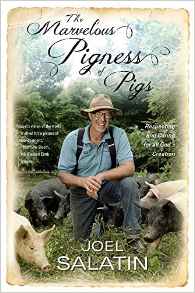 The Marvelous Pigness of Pigs: Respecting and Caring for all God’s Creation Joel Salatin (FaithWords) $25.00 Salatin runs his all natural family farm in Virginia’s Shenandoah Valley and is an outspoken Christian who became known in Michael Pollen’s book and documentary The Omnivore’s Dilemma. His family has been at this a long time (his grandfather was a charter subscriber to Rodale magazine, and his parents were talking about the dangers of chemicals at the time Rachel Carson’s Silent Spring took off.) We loved Salatin’s last book exposing the weird wrongness of our corporate food system and agribusiness practices — Folks, This Ain’t Normal (and we stock his others, such as Everything I Want to Do Is Illegal.) Here, he expressing a compelling Christian case for holy stewardship and how that effects the ways in which we think about (and participate in systems of) agriculture, food production, and eating. He is known for warmth and humor, and although he offers serious critique of the way we grow, market, and consume food in our land, this book is a great read. I love the title — it sounds like a line I once heard from Richard Mouw — which gets at the way God made stuff, and how to honor and be in sync with creational intentions and beauty. Yes, in Salatin’s eyes, pigness is marvelous. So is healthy eating. This looks like a great new book, and we can’t wait to talk more about it.
The Marvelous Pigness of Pigs: Respecting and Caring for all God’s Creation Joel Salatin (FaithWords) $25.00 Salatin runs his all natural family farm in Virginia’s Shenandoah Valley and is an outspoken Christian who became known in Michael Pollen’s book and documentary The Omnivore’s Dilemma. His family has been at this a long time (his grandfather was a charter subscriber to Rodale magazine, and his parents were talking about the dangers of chemicals at the time Rachel Carson’s Silent Spring took off.) We loved Salatin’s last book exposing the weird wrongness of our corporate food system and agribusiness practices — Folks, This Ain’t Normal (and we stock his others, such as Everything I Want to Do Is Illegal.) Here, he expressing a compelling Christian case for holy stewardship and how that effects the ways in which we think about (and participate in systems of) agriculture, food production, and eating. He is known for warmth and humor, and although he offers serious critique of the way we grow, market, and consume food in our land, this book is a great read. I love the title — it sounds like a line I once heard from Richard Mouw — which gets at the way God made stuff, and how to honor and be in sync with creational intentions and beauty. Yes, in Salatin’s eyes, pigness is marvelous. So is healthy eating. This looks like a great new book, and we can’t wait to talk more about it.
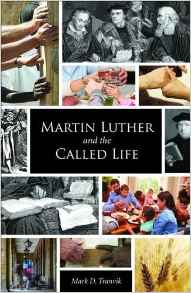 Martin Luther and the Called Life Mark D. Tranvik (Fortress Press) $24.00 I hope you know that one of the great dynamics of the Protestant reformation that was unleashed by Martin Luther’s remarkable role in those remarkably generative decades of the 1500 was a discovering of the Biblical teaching about vocation, calling and work as it applied not just to religious orders, monks, nuns, and parish priests, but to “butcher, bakers, and candlestick makers.” Yes, all people were called by God to offices, to positions of service for the common good. As more and more (especially younger Calvinists folks, it seems) are using this language and working on projects about work, many of us have been wishing for a better historical study of Luther’s own teaching on this that so revolutionized Protestant (and eventually, Roman Catholic) thought. Not everyone knows how extraordinary this teaching of the role of the so-called laity to work as unto God was and how it unleashed what was later called “the Protestant work ethic” and, perhaps, early modern versions of capitalism. At the very least, it started the conversation about how to serve God in our work-lives and what it means to see ourselves as called to vocations. This “rediscovering of Luther’s thought on vocation for life today” is going to be very useful for leaders and others who teach on this topic.
Martin Luther and the Called Life Mark D. Tranvik (Fortress Press) $24.00 I hope you know that one of the great dynamics of the Protestant reformation that was unleashed by Martin Luther’s remarkable role in those remarkably generative decades of the 1500 was a discovering of the Biblical teaching about vocation, calling and work as it applied not just to religious orders, monks, nuns, and parish priests, but to “butcher, bakers, and candlestick makers.” Yes, all people were called by God to offices, to positions of service for the common good. As more and more (especially younger Calvinists folks, it seems) are using this language and working on projects about work, many of us have been wishing for a better historical study of Luther’s own teaching on this that so revolutionized Protestant (and eventually, Roman Catholic) thought. Not everyone knows how extraordinary this teaching of the role of the so-called laity to work as unto God was and how it unleashed what was later called “the Protestant work ethic” and, perhaps, early modern versions of capitalism. At the very least, it started the conversation about how to serve God in our work-lives and what it means to see ourselves as called to vocations. This “rediscovering of Luther’s thought on vocation for life today” is going to be very useful for leaders and others who teach on this topic.
Listen to Mark Schwehn of Valparaiso University, who himself has thought and written about this for many years:
This book is a catechism on Christian vocation, using Luther’s life as an example, and Luther’s theology as a foundation. All Christian who want to live faithfully and gracefully, wherever they find themselves placed in the world, should read Martin Luther and the Called Life for both guidance and inspiration.
Tranvik is a professor at Augsburg College in Minneapolis, where he has directed the college’s Lily Endowment grant on vocation, so he has helped many — including many young adults — in the process of discerning their gifts and discovering their careers within the context of this robust thinking about vocation.
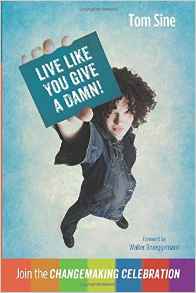 Live Like You Give a Damn! Join the Changemaking Celebration Tom Sine (Cascade Books) $24.00 Older readers will remember Tom Sine and his huge best-selling book of the 1970s, The Mustard Seed Conspiracy. It was forward looking for its day, delightfully documenting stories of those committed to peace and justice and living with purpose, even in careers and callings. It taught us how even little acts can sow seeds of wild hope, and how many churches and mission groups and campus ministry organizations were doing good, good work. Tom has spent the rest of his adult live documenting these projects, cheer-leading for responsible Christian innovation, for discerning trends, moving out in faith in good work, and wholistic mission. He was missional before the term was coined and he and his wife have mentored and encouraged hundreds if not thousands of emerging Christian leaders. (I loved his book, years after Mustard Seed that showed the new century version of that conspiracy, entitled The New Conspirators. It is will worth reading and we keep it in stock.)
Live Like You Give a Damn! Join the Changemaking Celebration Tom Sine (Cascade Books) $24.00 Older readers will remember Tom Sine and his huge best-selling book of the 1970s, The Mustard Seed Conspiracy. It was forward looking for its day, delightfully documenting stories of those committed to peace and justice and living with purpose, even in careers and callings. It taught us how even little acts can sow seeds of wild hope, and how many churches and mission groups and campus ministry organizations were doing good, good work. Tom has spent the rest of his adult live documenting these projects, cheer-leading for responsible Christian innovation, for discerning trends, moving out in faith in good work, and wholistic mission. He was missional before the term was coined and he and his wife have mentored and encouraged hundreds if not thousands of emerging Christian leaders. (I loved his book, years after Mustard Seed that showed the new century version of that conspiracy, entitled The New Conspirators. It is will worth reading and we keep it in stock.)
Alas, Tom is still at it — perhaps more urgent then ever — inviting others and envisioning for us what it might look like for people of faith to become social entrepreneurs, bold agents of new hope, making a difference where we can with lives lived with passion and purpose for the common good. He has noticed many young and energetic groups doing this, often outside of the church, using their brains and talents and connections to start good stuff to solve major problems (locally and globally.) Why aren’t those who follow Christ in the leadership of this new generation of changemakers? How can we mobilize and equip church folks (young and old) to use their gifts and interests in ways that align with God’s purposes in the world?
I’ve had opportunity to talk with Tom first hand about these things and chatting with him almost wears me out — he is a bundle of energy, a vision-caster, hope-maker, relational and quite the networker and, if I might say so, proof that the Pentecostal promise of Joel is true: old men, at least that old man, is still dreaming dreams, and inspiring the young ones among us. Tom and his wife have a wonderful ministry of hospitality — they are foodies, actually — and it is no accident that this provocative book title ends with a call to celebration. Yes, yes, yes. You should buy this book. In a very moving forward, even Walt Brueggemann notes that the book is “quite remarkable” and that Tom’s energy will be transmitted to readers. He says, “I am glad to commend this exposition that exhibits quite concretely ways to revision, reimagine, and reperform the gospel…”
Oh yes, and there’s this: Tom is serious about all this (playful and energetic as he is) so he has included exercises and experiences and questions and activities to use with each chapter so that you (and your group) can process this stuff. Live Like You Give a Damn will inspire you to do so, but also to take real action steps and find options for involvement and ways to discover your own possibilities, which are all part of the fun. This isn’t dry stuff about assets mapping or strategic planning, but more a holy and feisty practice of engaging in conversations around discerning calling and how to sow 21st century mustard seeds of wild, redemptive hope. This is a book, loaded with stories to combat cynicism or despair, and it is more. It is a guide to help you figure out how to join the celebration.
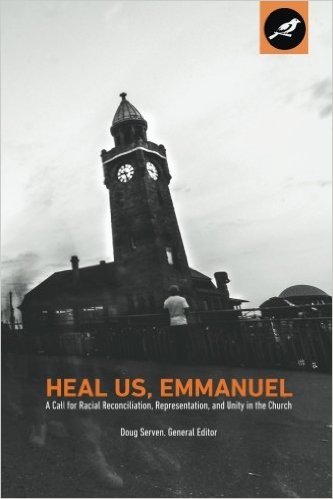 Heal Us, Emmanuel: A Call for Reconciliation, Representation, and Unity in the Church Doug Serven, editor (White Blackbird Books) $16.99 I will have to write about this in greater detail after spending more time with it, but this new resource is — if I may be so bold — one of the more significant books to be published within the conservative, Reformed faith community. Most of these authors are pastors, elders, or professors among the Presbyterian Church of America (PCA) and represent the good, good work being done within that denomination that has a bit of a racially storied legacy, stuff that has been talked about more and more of late. (One PCA church in Mississippi just recently issued a public proclamation of repentance and apology for a pro-segregation motion they passed in the 60s.) This book offers what PCA folk are known for — serious theology, good scholarship (the contributors have read widely and the footnotes are diverse and fascinating) and yet gospel centered with warmth and passion. (The irony that a book of multi-ethnic authors on being more inclusive and diverse includes no women is a matter of some weirdness, it seems to me.)
Heal Us, Emmanuel: A Call for Reconciliation, Representation, and Unity in the Church Doug Serven, editor (White Blackbird Books) $16.99 I will have to write about this in greater detail after spending more time with it, but this new resource is — if I may be so bold — one of the more significant books to be published within the conservative, Reformed faith community. Most of these authors are pastors, elders, or professors among the Presbyterian Church of America (PCA) and represent the good, good work being done within that denomination that has a bit of a racially storied legacy, stuff that has been talked about more and more of late. (One PCA church in Mississippi just recently issued a public proclamation of repentance and apology for a pro-segregation motion they passed in the 60s.) This book offers what PCA folk are known for — serious theology, good scholarship (the contributors have read widely and the footnotes are diverse and fascinating) and yet gospel centered with warmth and passion. (The irony that a book of multi-ethnic authors on being more inclusive and diverse includes no women is a matter of some weirdness, it seems to me.)
The authors are mostly working pastors or church leaders, and it shows. Although it is seriously done and mature, this isn’t a thought-piece for the academy or showy “prophetic” stuff to make a statement. This is sincere, pastoral theology, grappling with racism and white privilege in their own denomination, and in the wider evangelical communions. Most of the authors are not nationally known (although you may have heard of Kevin Twit, founder of Indelible Grace music, who has a great piece. I suspect it was from Kevin that the book title came about: it is taken from the title of an old William Cowper hymn.)
Rev. Dr. Carl Ellis, Jr. is a seminary professor and associate pastor of New City Fellowship in Chattanooga, TN. He has been a leader to many on this topic (he wrote a fabulous book which we still stock called Free at Last: The Gospel in the African American Experience) and he has a splendid, earnest foreword in which he says, “Heal Us, Emmanuel is a must-read and a must-have in the library of anyone who is serious about honoring God in this age of polarization.”
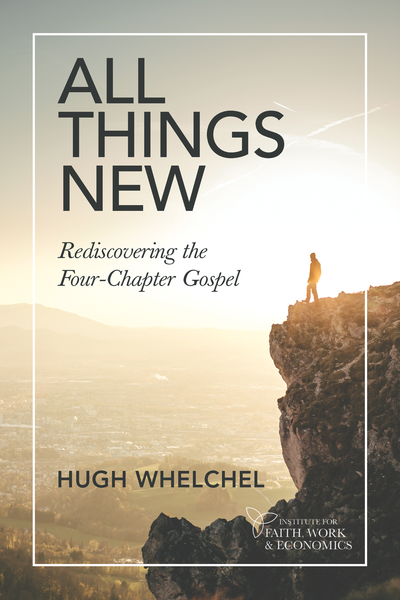 All Things New: Rediscovering the Four Chapter Gospel Hugh Whelchel (Institute for Faith, Work & Economics) $6.99 Hold on to your hats, folks — this is quite an announcement. Here is a little book many of us have been looking for. It is a book that explores the creation-fall-redemption-restoration story. (Did you see how I used that phrase as I lead into the description of Lisa Sharon Harper’s forthcoming book The Very Good Gospel by noting how she offers a similar overview of the big Bible story as one of shalom/shalom wrecked/shalom restored?) This move to see the unfolding drama of Scripture by way of four acts in a play, or four chapters in a story — God’s intentions, sin’s wreckage, Christ’s redemption and the scope of hope as creation is regained — (again, that’s creation/fall/redemption/restoration) is generative and useful, and many folks have asked us for a small group resource to do this in home Bible studies or Sunday school classes or discussion groups.
All Things New: Rediscovering the Four Chapter Gospel Hugh Whelchel (Institute for Faith, Work & Economics) $6.99 Hold on to your hats, folks — this is quite an announcement. Here is a little book many of us have been looking for. It is a book that explores the creation-fall-redemption-restoration story. (Did you see how I used that phrase as I lead into the description of Lisa Sharon Harper’s forthcoming book The Very Good Gospel by noting how she offers a similar overview of the big Bible story as one of shalom/shalom wrecked/shalom restored?) This move to see the unfolding drama of Scripture by way of four acts in a play, or four chapters in a story — God’s intentions, sin’s wreckage, Christ’s redemption and the scope of hope as creation is regained — (again, that’s creation/fall/redemption/restoration) is generative and useful, and many folks have asked us for a small group resource to do this in home Bible studies or Sunday school classes or discussion groups.
This small book has short chapters — one on creation and all that that implies, one on sin and the implications of living in a fallen world, a third on Christ-bought redemption, and a fourth on the big hope of God’s promised restoration of all things. A fifth session contrasts this wholistic “four chapter” story with a more common-place “two chapter” version (we’re sinners and God forgives us.) The last chapter invites participants to discuss why this all matters.
So All Things New is itself a six week study, designed with very short chapters and inductive questions from Bible verses, and would be ideal for any home Bible study, small group, or class that doesn’t want to wade through bigger books.
Hugh Whelchel is a good, good, guy, a business person who wrote the fantastic paperback How Then Should We Work? He formerly served as the President of the Washington DC campus of RTS (Reformed Theological Seminary.)
Hurray, somebody said the other day. Now you don’t have to write this, as I often said that if nobody did such a Bible study guide soon, I would. Hooray, indeed.
On this title, since it is designed for a small group, order 5 or more and get a 20% discount. We’ll gladly offer that extra savings for larger orders.
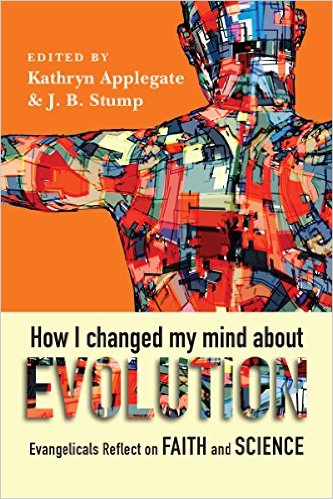 How I Changed My Mind About Evolution: Evangelicals Reflect on Faith and Science edited by Kathryn Applegate & J.B Stump (IVP Academic) $16.00 This project was part of the work of BioLogos, a faith/science think tank and advocacy group headed up by our esteemed friend, Harvard trained, evangelical and Christian Reformed scientist Deborah Haarsma. It is a great example of what a small book can do; it is a fine, fine, paperback — an extraordinary volume collecting first hand testimonials by a real variety of scholars. As is obvious from the title, these stories tell of the ways in which these thinkers changed their minds. That in itself is helpful — thank goodness for those willing to admit they’ve switched positions and grown and (dare I say it, with a smile) evolved. This topic — what one thinks of science, generally, and evolution, particularly — is laden with theological concerns (some quite legitimate, some mere baggage) and it is notable to have serious thinkers admit they’ve grown in nuance and insight as they’ve navigated to their own position in this field.
How I Changed My Mind About Evolution: Evangelicals Reflect on Faith and Science edited by Kathryn Applegate & J.B Stump (IVP Academic) $16.00 This project was part of the work of BioLogos, a faith/science think tank and advocacy group headed up by our esteemed friend, Harvard trained, evangelical and Christian Reformed scientist Deborah Haarsma. It is a great example of what a small book can do; it is a fine, fine, paperback — an extraordinary volume collecting first hand testimonials by a real variety of scholars. As is obvious from the title, these stories tell of the ways in which these thinkers changed their minds. That in itself is helpful — thank goodness for those willing to admit they’ve switched positions and grown and (dare I say it, with a smile) evolved. This topic — what one thinks of science, generally, and evolution, particularly — is laden with theological concerns (some quite legitimate, some mere baggage) and it is notable to have serious thinkers admit they’ve grown in nuance and insight as they’ve navigated to their own position in this field.
Here you will find pieces by scientists such as Jennifer Wiseman, one of our leading astronomers, NIH scientist Francis Collins, Deborah Haarsma, and Denis Lamoureux as well as Biblical scholars (Tremper Longman, Scot McKnight, N.T. Wright) and theologians and philosophers such as Oliver Crisp, James K.A. Smith, Richard Mouw, and Amos Young. Even working pastors weigh in, telling their stories — you’ll be touched by the candor of Ken Fong, John Ortberg, and Laura Truax and other good preachers. Rave reviews for How I Changed My Mind… come from a variety of places — Andrew Root, Mark Labberton, Mark Noll and Denis Alexander (the emeritus director of The Faraday Institute for Science and Religion) all rave. This is a very, very nicely done book.
Kudos to Dr. Applegate, who is program director at BioLogos and she is skilled at designing programs aimed at translating scholarship on origins for the evangelical church, and Dr. Stump, a senior editor at BioLogos and author of Science and Christianity: An Introduction to the Issues. Agree or not with their insights, I hope you will be touched and gladdened by the honest telling of their tales. I’d even bet you could think of persons to whom this book would be a life-line, a great and grace-filled gift. Get one today!
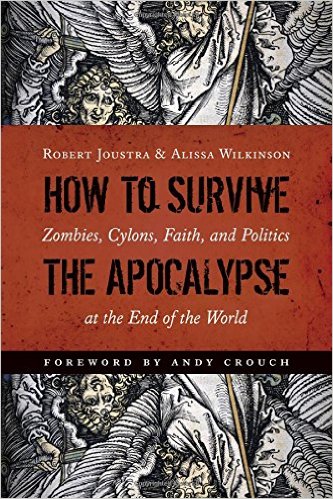 How to Survive The Apocalypse: Zombies, Cylons, Faith, and Politics at the end of the World Robert Joustra & Alissa Wilkinson (Eerdmans) $16.00 Okay, I’m going to admit it. I haven’t read this yet, although I’ve been anticipating this for a year before it came out. The authors are my acquitances, and among the smartest, most astute young scholars I know. Both write professionally — you surely know Alissa from her well-respected work as film critic at Christianity Today and may know Joustra for his astute political-slash-philosophical commentary at Comment, the “public theology for the common good” journal edited by James K.A. Smith. So these are good thinkers and great writers, doing this very clever project: how in the world do we do hopeful, faithful politics in an age when everything is going to hell in a hand-basket. From Walking Dead to the zombie apocalypse, from the dystopian Hunger Games and Game of Thrones to the jaded House of Cards, this pop-culture savvy study is, in fact, an exploration of Charles Taylor and more.
How to Survive The Apocalypse: Zombies, Cylons, Faith, and Politics at the end of the World Robert Joustra & Alissa Wilkinson (Eerdmans) $16.00 Okay, I’m going to admit it. I haven’t read this yet, although I’ve been anticipating this for a year before it came out. The authors are my acquitances, and among the smartest, most astute young scholars I know. Both write professionally — you surely know Alissa from her well-respected work as film critic at Christianity Today and may know Joustra for his astute political-slash-philosophical commentary at Comment, the “public theology for the common good” journal edited by James K.A. Smith. So these are good thinkers and great writers, doing this very clever project: how in the world do we do hopeful, faithful politics in an age when everything is going to hell in a hand-basket. From Walking Dead to the zombie apocalypse, from the dystopian Hunger Games and Game of Thrones to the jaded House of Cards, this pop-culture savvy study is, in fact, an exploration of Charles Taylor and more.
Check out these great blurbs:
Makoto Fujimura
— artist, speaker, writer, cultural shaper
“In our culture dominated by fear and anxiety, I am grateful for the wisdom of teachers like Robert Joustra and Alissa Wilkinson in How to Survive the Apocalypse. From Mel Brooks to Game of Thrones, from the movie Her to the board game Settlers of Catan, this book is full of deft and engaged analysis, helping all of us to move deeper into our ‘secular age’ with conviction and faith.”
Michael Wear
— founder of Public Square Strategies LLC
“Who said the apocalypse couldn’t be fun? I binge-read this book. Wilkinson and Joustra take up some of the most important questions of our day in a fresh way. They give us a guide to the cultural and political terrain we must navigate together, providing encouragement to faithful Christians to enter the public square with confidence and purpose.”
Brett McCracken
— film critic, author of Gray Matters and Hipster Christianity
“An exceptional piece of theologically rigorous, culturally perceptive criticism. With Charles Taylor’s monumental book A Secular Age as a guide, Joustra and Wilkinson show how narratives of dystopian apocalypse in contemporary films and television reveal deep philosophical, theological, and existential truths about today’s world. . . . Whether dissecting Mad Men or The Hunger Games, Scandal or Game of Thrones, this book’s analysis is timely, wide-ranging, and coherent, shedding light on power, politics, identity, and more in the twenty-first century.”
Richard Mouw
— president emeritus of Fuller Theological Seminary
“Dear Netflix: Hold off on sending Parks and Recreation and start me on the second season of The Walking Dead. After reading this terrific book by Alissa Wilkinson and Robert Joustra, I have decided I am ready for more apocalypse. I had been immersed in the writings of Alasdair MacIntyre and Charles Taylor, but this book helped me connect their philosophical explorations to dystopian narratives. So I am now going to work at coming up with my own informed understandings of zombie plots.”
Kevin R. den Dulk
— director of the Henry Institute, Calvin College
“Robert Joustra and Alissa Wilkinson insist the end is not near; it’s already here, in the zeitgeist, even if the zombies and robot overlords are still at bay. With philosopher Charles Taylor as their guide, they cast a keen eye on how apocalyptic visions in recent popular culture reflect our rootless search for ‘authentic’ selves in a secular age. But they also leave us with a compelling alternative to defeatism in the face of the end times — a clear-eyed pluralism rooted in the building of faithful institutions.”
Stephanie Summers
— CEO of the Center for Public Justice
“With style and skill, Wilkinson and Joustra demonstrate that popular entertainment tells us something deeply important about ourselves. As our guides on a wide-ranging tour with an itinerary that includes Charles Taylor, Parks and Recreation, and modern political philosophy among many other stops, they lead us to a place where our participation as citizens is wholeheartedly encouraged and affirmed.”
Gregory Alan Thornbury
— president of The King’s College
“All too often, books on pop culture by Christian scholars, pastors, and theologians lapse into the ‘what to think’ category. What’s different about reading How to Survive the Apocalypse is that we understand better why we’re seeing what we’re seeing. That’s because a political philosopher (Joustra) and a cultural critic (Wilkinson) are probably in better position to guide us as to how our secular age has become perennially obsessed with the fantasy of ‘the end of the world.’ “
Publishers Weekly
” ‘Just turn on the television. . . . Today, apocalypse sells like mad,’ write Joustra and Wilkinson. Instead of lamenting secularized versions of the end times, however, the authors engage with them through an in-depth theological critique of popular culture. They note that the idea of future chaos followed by restoration has been a religious theme for millennia, starting with the first apocalyptic text from ancient Egypt. After a fascinating, breakneck rundown of utopian versus dystopian notions from biblical times onward, Joustra and Wilkinson zero in on recent movies and — especially — TV shows. . . . It is refreshing to see a willingness to find the best in secular art, rather than a blanket dismissal of it.”
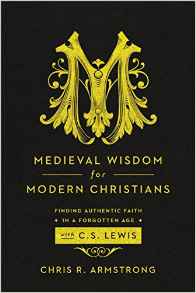 Finding Authentic Faith in a Forgotten Age with C.S. Lewis Chris R. Armstrong (Brazos Press) $19.99 Another book that should have you clicking send asap — this is a “must read” book that will be loved by anyone who savors great learning, good insights about our past, or C.S. Lewis, for that matter. Armstrong is a wiz of a guy and a good friend; he is the director of Opus: The Art of Work, an institute on faith and vocation and Wheaton College. Previously, he has been a writer at Christian History magazine — and, oh, how I loved his previous Patron Saints for Postmoderns, an only mildly edgy guide to why we, today, need to know something about those Christian leaders who have gone before us. This new one is just what it promises: a wonderful introduction to a neglected era of our Christian tradition.
Finding Authentic Faith in a Forgotten Age with C.S. Lewis Chris R. Armstrong (Brazos Press) $19.99 Another book that should have you clicking send asap — this is a “must read” book that will be loved by anyone who savors great learning, good insights about our past, or C.S. Lewis, for that matter. Armstrong is a wiz of a guy and a good friend; he is the director of Opus: The Art of Work, an institute on faith and vocation and Wheaton College. Previously, he has been a writer at Christian History magazine — and, oh, how I loved his previous Patron Saints for Postmoderns, an only mildly edgy guide to why we, today, need to know something about those Christian leaders who have gone before us. This new one is just what it promises: a wonderful introduction to a neglected era of our Christian tradition.
Look: Armstrong has taught church history, yes. But, as we noted, he directs a center designed to help young adults integrate faith and learning so they might be nurtured in a broad vision of vocation, serving God in their future careers and callings. He is eager to help people live out daily discipleship very much in the modern world, the world you and I live in, for real. (Heck, he is an editor at the Patheos Faith and Work Channel — a quintessentially contemporary enterprise.) So don’t think this is for stodgy old medievalists or those who have time to be quaint.
Although, when you finish this lovely, fascinating, well-written book, you might be glad to think of yourself as somewhat of a medievalist. This is sturdy, relevant, amazing stuff. As Dennis Okholm (himself author of Dangerous Passions, Deadly Sins Learning from the Psychology of Ancient Monks) says,
Armstong’s approach to introducing twenty-first century Christians to the rich resources of medieval and monastic wisdom is ingenious. He uses C.S. Lewis to invite us into a conversation with other contemporaries who have found that this oft-neglected period of Christian history provides the kind of embodied and holistic spiritual life that is needed as a remedy for today’s gnostic, individualistic, and shallow spirituality.
I like that the famous historian from Duke Divinity School, Grant Wacker, says this is written “with lilting prose and sparkling insight.” Just what we want in a book that uses Lewis to get to a “long-past but still remarkably relevant era.”
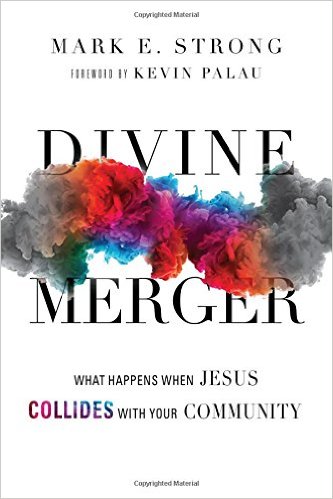 Divine Merger: What Happens When Jesus Collides with Your Community Mark E. Strong (IVP) $16.00 Again, this is a book I’m eager to tell you about, a great little sleeper of a book that you may have missed. The author is senior pastor of LifeChange Christian Church, a diverse congregation located in inner city Portland. Okay, get that: Portland is known as a pretty hip but secularized city, and the inner city — well, any church that is thriving and doing good community development stuff could be a model and inspiration for us all. I took notice of this church leader years ago, and am glad to see he has this new book. It is a bit about urban ministry (think of John Perkins and the CCDA) and mostly about how to think well about missional congregational life — wherever you find yourself. Strong has pioneered innovative and energetic community ministry and has truly earned the right to tell his story (and inspire us all.) I am not alone as he is esteemed in his community and among evangelical leaders throughout the Pacific Northwest.
Divine Merger: What Happens When Jesus Collides with Your Community Mark E. Strong (IVP) $16.00 Again, this is a book I’m eager to tell you about, a great little sleeper of a book that you may have missed. The author is senior pastor of LifeChange Christian Church, a diverse congregation located in inner city Portland. Okay, get that: Portland is known as a pretty hip but secularized city, and the inner city — well, any church that is thriving and doing good community development stuff could be a model and inspiration for us all. I took notice of this church leader years ago, and am glad to see he has this new book. It is a bit about urban ministry (think of John Perkins and the CCDA) and mostly about how to think well about missional congregational life — wherever you find yourself. Strong has pioneered innovative and energetic community ministry and has truly earned the right to tell his story (and inspire us all.) I am not alone as he is esteemed in his community and among evangelical leaders throughout the Pacific Northwest.
Listen to this, by leaders we respect and writers we like:
“Mark Strong is a legend in our city. The archetype of a wise, humble, faithful urban pastor. Many younger planters look to him for more than mentorship, but for a template to pour our own lives into. When a guy like Mark talks about the collision of Jesus and community, I listen.”
–John Mark Comer, Bridgetown: A Jesus Church, Portland, OR
“Mark Strong is a pastor’s pastor, and a deeply committed leader and preacher. In Divine Merger he challenges us to do the spiritual work of bringing our communities and our churches together. He does this with wisdom and grace, inviting us to intentionally seek God’s leading for change for both sides. The book is inspiring, biblical and practical. If you want to catalyze change in your church and community, this book, filled with stories of Mark’s own experiences and insights learned on the battlefront, can be a trusted guide.”
–MaryKate Morse, George Fox Seminary, author of A Guidebook to Prayer
“Gentrification, spiritual lethargy and the clash between new realities and old dreams are part of Mark’s journey as a leader in his church and community. As one who strives to live his life fully invested in both spheres, Mark provides in this book a mixture of practical implementation, pastoral encouragement and theological grounding for embracing our call to partner with Jesus in the transformative collisions between our church and our community.”
–Rick McKinley, lead pastor, Imago Dei Community, Portland, OR, author of Jesus in the Margins
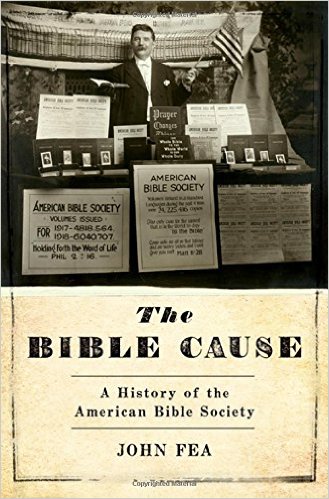 The Bible Cause: A History of the American Bible Society John Fea (Oxford University Press) $29.95 I don’t know how many working historians you know, or even how many serious history professors, but Fea is a gem, a local treasure, a fun and whimsical guy who does remarkably serious scholarship. Amidst his other award winning writing, teaching, and philosophizing — not to mention being a cool local fellow and husband and dad — John was recruited by the American Bible Society to document their 200 anniversary. The Bible Society, it is interesting to note, is the nation’s oldest philanthropy, and it is, to put it politely, storied.
The Bible Cause: A History of the American Bible Society John Fea (Oxford University Press) $29.95 I don’t know how many working historians you know, or even how many serious history professors, but Fea is a gem, a local treasure, a fun and whimsical guy who does remarkably serious scholarship. Amidst his other award winning writing, teaching, and philosophizing — not to mention being a cool local fellow and husband and dad — John was recruited by the American Bible Society to document their 200 anniversary. The Bible Society, it is interesting to note, is the nation’s oldest philanthropy, and it is, to put it politely, storied.
Fea was given complete and open access to the legendary ABS records — imagine the joy of finding documents of support from the likes of Francis Scott Key or Theodore Roosevelt — and refused any sense that he was to write a puff piece or in-house congratulatory document for their own bi-centennial celebration. No, this is the real, deal, worthy of such an important, historic organization and worthy of such a prestigious, scholarly publishing house. Dr. Fea turned his skills towards telling this story well, with accuracy and insight, with charming anecdote and revealing stories.
The ABS has aligned itself, often, with gatekeepers of American culture, and their single-minded passion to promote Bible distribution has been inspiring, and, admittedly, a bit perplexing, if not troubling. With endorsements from major historians such as Mark Noll or Margaret Bendroth (the Executive Director of the Congregational Library and Archives) The Bible Cause is going to be an enduring and important bit of American history research.
In the words of Laurie Haffly-Kipp (who wrote Setting Down the Sacred Past: African American Race Histories) “Fea leas us through Bible distribution in ever-widening circles. His expansive sweep highlights dissemination on the US frontier, within war-ravaged communities of the postbellum American South, and around the globe. He shows how the Good Book both followed and accompanied US imperial aspirations, and also how its influence motivated believers to see American as a Christian nation united by reverence for the Word.”
Well, so there’s that. And John Fea brings it all, in fascinating detail. As Mark Noll says, The Bible Cause “is full of unusually perceptive insights… it is a splendid book to mark a noteworthy anniversary.”
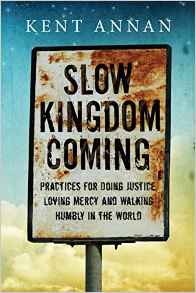 Slow Kingdom Coming: Practices for Doing Justice, Loving Mercy and Walking Humbly in the World Kent Annan (IVP) $16.00 Emblazoned in bold, blunt print on the back of this remarkable book is this obvious quote: “No one said pursuing justice would be easy.” And yet, we all get distracted, or, if active, burned out. Who doesn’t struggle with cynicism and even despair, being jaded or just weary? Big hope or not, to be active in taking on the cares of the needy or the desire for a better world (whatever your cause or passion) is tiring. We get self-righteous, we get testy, we get anxious. Do you know what I’m talking about?
Slow Kingdom Coming: Practices for Doing Justice, Loving Mercy and Walking Humbly in the World Kent Annan (IVP) $16.00 Emblazoned in bold, blunt print on the back of this remarkable book is this obvious quote: “No one said pursuing justice would be easy.” And yet, we all get distracted, or, if active, burned out. Who doesn’t struggle with cynicism and even despair, being jaded or just weary? Big hope or not, to be active in taking on the cares of the needy or the desire for a better world (whatever your cause or passion) is tiring. We get self-righteous, we get testy, we get anxious. Do you know what I’m talking about?
There have been a number of books by respected, seasoned, righteous activists that I’ve suggested as must reads for anyone in serious, culturally-engaged discipleship who want to keep at it, fresh and refreshed, for the long haul, trying hard to make a difference. I’ve often commended The World Is Not Ours To Save by peace activist Tyler Wigg-Stevenson and Doing Good Without Giving Up by environmental activist Ben Lowe. I enjoyed and learned much from Just Spirituality: How Faith Practices Fuel Social Action by Mae Elise Cannon — a gem of a resource, with each chapter highlighting a faith practice as lived out by a certain hero of Christian peace and justice work. That these are all published by InterVarsity Press is telling: they get something very, very important about “a long obedience in the same direction” as one of their bestsellers by Eugene Peterson puts it. Anyway, add, now, my friend Kent Annan’s new book to this good handful of books in this marvelous genre. Kent, as much as anybody, knows well this hardship, this struggle, this need to be spiritually alive in order to keep at it our work.
Kent has written two other remarkably moving books, must-reads for anyone interested in global development. (He has worked and lived in Haiti, before and after the awful earthquake there, documented passionately in the exquisite, painful, After Shock.) Here, in this brand new one, he walks us through sustainable practices fore those who want to live out faith in caring ways. He explores ways to hep us “participate in the coming Kingdom”
Here are the chapter titles — you must believe me when I say he opens up in-depth and thoughtful considerations about our spirituality in these areas.
Attention: Awakening to Justice
Confession: The Posture for Engaging
Respect: The Golden Rule for Helping
Partnering: With Not For
Truthing: Hard Thinking and Feet on the Ground
And, then, this last piece, before a handful of appendices, study guides and the like: Practicing Faithfully Even When We Are Overwhelmed.
Did you get that? Practicing Faithfully Even When We Are Overwhelmed.
I think Jena Lee Nardella of Blood: Water Mission (and author of one of last year’s best stories, One Thousand Wells) is exactly right when she says: Slow Kingdom Coming is one of the most honest yet hopeful reads for those who seek to do the work of justice today.”
The work of doing justice and loving mercy is dependent upon our walking humbly with God, and this isn’t quick or easy stuff. As Eugene Cho says, “it is long, laborious, and often messy…” This is a great, great book to guide you into and maybe a bit through the mess. Order it today!
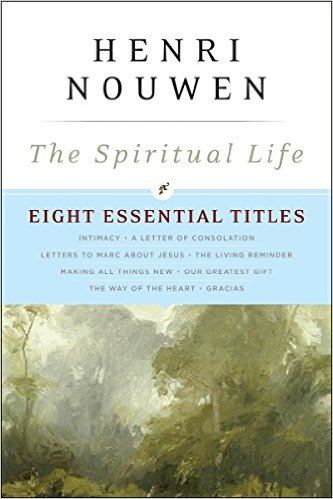 The Spiritual Life: Eight Essential Titles Henri Nouwen (HarperOne) $27.99 Wow. I don’t know exactly what an omnibus is, but I bet it is something like this. Man, what a great, great volume.
The Spiritual Life: Eight Essential Titles Henri Nouwen (HarperOne) $27.99 Wow. I don’t know exactly what an omnibus is, but I bet it is something like this. Man, what a great, great volume.
In one big, fat, paperback (of 665 pages) the publisher Harper has combined all of the books of Father Nouwen that they publisher – eight of them, in full . A few of these have only been available in hardcover, and it is a great, great bargain to have them all in one convenient big paperback, a great savings.
In full paperback with french folded covers — not unlike the way they did The Complete C.S. Lewis Signature Classics or A Testament of Hope: The Essential Writings and Speeches of Martin Luther King, Jr — this big book includes a lot. I assume you know how lovely and wise Nouwen was, and, yet, I bet that some of these books are not in your personal collection.
Here are the complete books by Nouwen that in in this one volume:
Intimacy
A Letter of Consolation
Letters to Marc About Jesus
The LIving Reminder
Making All Things New
Our Greatest Gift
The Way of the Heart
Gracias!
My, oh my. If you have most of these, you know how rich and beautiful and helpful they are. If you don’t have most, then you may want to pick this up and get ’em all in one good volume. This is good stuff, friends. Kudos to HarperOne for this good, good release. “The Kingdom is a place where God’s Spirit guides us, heal us, challenges us, and renews us continuously” Nouwen has written. “When we set our hearts on the life in the Spirit of Christ, we will come to experience intimate connections between our spiritual life and our temporal needs. When we remain attentive to this divine presence, we will be led always deeper into the kingdom.” May it be so.
We’ve shown the regular retail price on these, but will deduct the discount when you click below. Those links take you to our secure order form page…. easy; just tell us what you want, old-school, person to person. We’ll follow up with a prompt confirmation, assuring you that we’ve got your order and that we’re taking care your selections, wrapping them with a smile and a prayer. Thanks for caring about good books, and for being faithful to our bookish mission here at Hearts & Minds. Let us know if you have any questions, want to ask about any of these selections, or if we can serve you in any further way. Happy reading.
BookNotes
DISCOUNT
ANY ITEM MENTIONED
10% off
order here
takes you to the secure Hearts & Minds order form page
just tell us what you want
inquire here
if you have questions or need more information
just ask us what you want to know
Hearts & Minds 234 East Main Street Dallastown, PA 17313 717-246-3333
